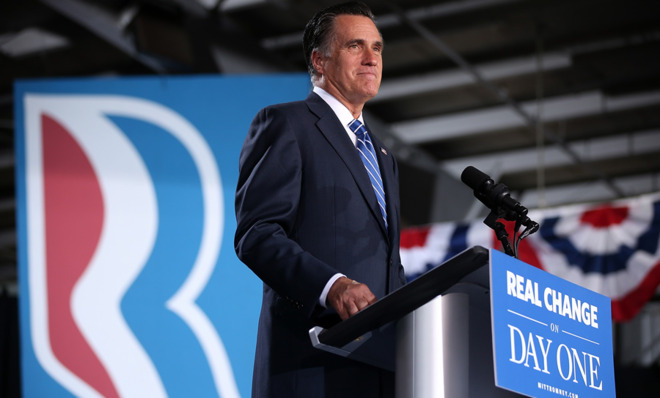The laughable campaign to get Mitt Romney to run in 2016
For the two-time candidate, a third time would definitely not be a charm


More than once over the past few weeks, as the Draft Mitt petition has rocketed upward past 50,000 signatures, a politically informed friend has predicted that Mitt Romney will run for president in 2016. Each time I've dismissed the notion — though now I'm beginning to wonder if I've been overestimating Romney's intelligence.
The occasion for my latter-day soul searching is Rep. Jason Chaffetz's Monday-night appearance on MSNBC's Hardball, in which the Utah Republican told host Chris Matthews that he thinks Mitt is "actually going to run, and I think he will be the next president of the United States."
I concede that it's unlikely a Romney ally would make such a public declaration if Romney wasn't seriously considering a run.
The Week
Escape your echo chamber. Get the facts behind the news, plus analysis from multiple perspectives.

Sign up for The Week's Free Newsletters
From our morning news briefing to a weekly Good News Newsletter, get the best of The Week delivered directly to your inbox.
From our morning news briefing to a weekly Good News Newsletter, get the best of The Week delivered directly to your inbox.
What I will not concede is that Romney has even the slightest chance of fulfilling the second half of Chaffetz's prediction. If Mitt wants to humiliate himself and his family by wasting yet another two years of his life and tens of millions of dollars of his fortune in an effort to win the White House, he's of course free to do so. But the effort will fail.
Consider, to begin with, that this would be Romney's third consecutive presidential campaign. Twice is perfectly acceptable in our political culture. But a third, especially when it follows a loss in the general election, makes the candidate look like a delusional, monomaniacal loser who can't take "no" for an answer. The result would be a campaign that primarily serves as a sideshow or spoiler.
Now think about Romney's influence on his party and its image. Thanks to Mitt's decision to run a general election campaign resolutely focused on kissing up to entrepreneurs, the GOP is now more than ever identified as the party of super-rich (and super-white and super-stuffy) businessmen who look down their plutocratic noses at the 47 percent of Americans who are parasitic "moochers."
That was political poison back in 2012, but it's even more out of step with the country's current anti-establishment mood. A Romney run in 2016 would be almost comically ill-timed, since Mitt might be the one person in America who could manage to make Hillary "not well off" Clinton look like a populist. (Against a genuine populist of the left like Elizabeth Warren, an explicitly pro-business Romney might gain somewhat more traction.)
A free daily email with the biggest news stories of the day – and the best features from TheWeek.com
But why couldn't Romney simply distance himself from the excesses and missteps of the 2012 campaign and reinvent himself with a message aimed at working families?
Because you only get so many second chances in politics, and Romney used his up a long time ago.
Once upon a time, Romney was a moderate governor of the liberal state of Massachusetts, where he helped to shape and oversee the implementation of a health-care-reform law that served as the model for the Affordable Care Act. In 2007 and ’08, he remade himself as a foreign policy tough guy and a champion of the religious right. When that didn't work, he reinvented himself again for the 2012 campaign, this-time as a no-nonsense, job-creating businessman.
Each time Romney has altered his image, he's paid a political price — earning a reputation as at best a serial flip-flopper, and at worst a shameless opportunist who was willing to denounce his signature achievement in elected office (RomneyCare) in order to ingratiate himself to the GOP's core of rabidly anti-ObamaCare voters.
For Romney to attempt yet another act of reinvention would be politically suicidal, especially when his biography (co-founder of Bain Capital) so strongly reinforces his current image as a rich man singularly dedicated to the proposition that the world is better off run by rich men.
And that points to a final consideration: Romney was an atrocious campaigner, combining a persona more weirdly wooden than Al Gore's with a track record so shot through with contradictions that he often seemed like he was auditioning to serve as a poster boy for political inauthenticity. The GOP base recognized his vulnerability and only rallied (reluctantly) around the Romney campaign once the candidate had won the primaries by default. (A similar dynamic played out with John McCain in 2008.)
How likely is it that GOP voters and delegates would allow the party to be saddled with the same weak nominee four years later?
Not at all.
Or so it seems to me.
Perhaps I'm wrong. Maybe the nearly 52,000 people who have signed the Draft Mitt petition represent a grassroots movement to give Romney a third chance. Though I think it's much more likely that the "former Romney campaign workers and donors" who are behind the effort have tapped into residual Mormon enthusiasm for Mitt.
Or maybe some well-organized and devious Democrats are making some mischief for Republicans by signing the petition, inflating the number of signatures, and contributing to the illusion of broad-based support for a Romney candidacy.
Either way, Mitt Romney would be a fool to think he has any chance of winning the White House in 2016.
Damon Linker is a senior correspondent at TheWeek.com. He is also a former contributing editor at The New Republic and the author of The Theocons and The Religious Test.
-
 The best fanfic that got published and went mainstream
The best fanfic that got published and went mainstreamThe Week Recommends Fan fiction websites are a treasure trove of future darlings of publishing
-
 ‘Something close to a universal rallying cry’
‘Something close to a universal rallying cry’Instant Opinion Opinion, comment and editorials of the day
-
 Trump sues IRS for $10B over tax record leaks
Trump sues IRS for $10B over tax record leaksSpeed Read The president is claiming ‘reputational and financial harm’ from leaks of his tax information between 2018 and 2020
-
 The billionaires’ wealth tax: a catastrophe for California?
The billionaires’ wealth tax: a catastrophe for California?Talking Point Peter Thiel and Larry Page preparing to change state residency
-
 Bari Weiss’ ‘60 Minutes’ scandal is about more than one report
Bari Weiss’ ‘60 Minutes’ scandal is about more than one reportIN THE SPOTLIGHT By blocking an approved segment on a controversial prison holding US deportees in El Salvador, the editor-in-chief of CBS News has become the main story
-
 Has Zohran Mamdani shown the Democrats how to win again?
Has Zohran Mamdani shown the Democrats how to win again?Today’s Big Question New York City mayoral election touted as victory for left-wing populists but moderate centrist wins elsewhere present more complex path for Democratic Party
-
 Millions turn out for anti-Trump ‘No Kings’ rallies
Millions turn out for anti-Trump ‘No Kings’ ralliesSpeed Read An estimated 7 million people participated, 2 million more than at the first ‘No Kings’ protest in June
-
 Ghislaine Maxwell: angling for a Trump pardon
Ghislaine Maxwell: angling for a Trump pardonTalking Point Convicted sex trafficker's testimony could shed new light on president's links to Jeffrey Epstein
-
 The last words and final moments of 40 presidents
The last words and final moments of 40 presidentsThe Explainer Some are eloquent quotes worthy of the holders of the highest office in the nation, and others... aren't
-
 The JFK files: the truth at last?
The JFK files: the truth at last?In The Spotlight More than 64,000 previously classified documents relating the 1963 assassination of John F. Kennedy have been released by the Trump administration
-
 'Seriously, not literally': how should the world take Donald Trump?
'Seriously, not literally': how should the world take Donald Trump?Today's big question White House rhetoric and reality look likely to become increasingly blurred
